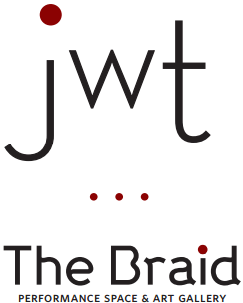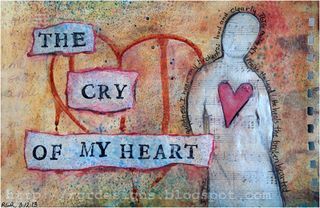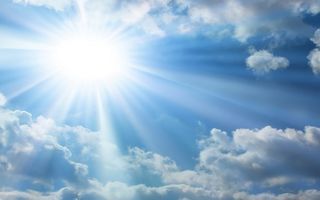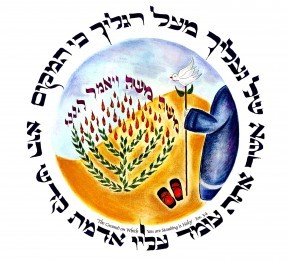Rachel Barenblat's Blog, page 111
January 8, 2016
Tu BiShvat Resources for Our Living Planet
Cross-posted from Kol ALEPH, the blog of ALEPH: Alliance for Jewish Renewal.
This year we (at ALEPH: Alliance for Jewish Renewal) rededicate ourselves to caring for our living planet as a place of holiness. Tu BiShvat, the New Year of the Trees (coming up on January 25), is a natural opportunity to link our deep ecological values with the life of the spirit. Here are some resources which we hope will bring added meaning to your Tu BiShvat:
Rededication (pdf) - a new liturgical poem for Tu BiShvat by Rabbi Rachel Barenblat
Blessing for Tu BiShvat (pdf) - a prayer from the original Tu BiShvat haggadah, offered by Rabbi David Seidenberg at NeoHasid.org
One page flowchart haggadah (pdf) - a one-page printable flowchart haggadah, offered by Rabbi David Seidenberg at NeoHasid.org
A digital haggadah for Tu BiShvat (slideshow / powerpoint) - a new digital haggadah for Tu BiShvat, intended for projection on a screen (to save trees!) Liturgy, poems, prayers, video, and more. That same haggadah is available online via slideshare:
A Digital Haggadah for Tu BiShvat
May our celebrations of Tu BiShvat bring us closer to healing our living planet and connecting us with the One Who enlivens and sustains us all.

January 2, 2016
On peeling away what protects us from the world
I offered an extemporaneous d'var Torah at services yesterday. This is what I said, more or less. (Deep thanks to my hevruta partner, with whom I shared these thoughts afterwards, and who offered the insight about being unsteady on one's feet.)
וַיֹּאמֶר, אַל-תִּקְרַב הֲלֹם; שַׁל-נְעָלֶיךָ מֵעַל רַגְלֶיךָ--כִּי הַמָּקוֹם אֲשֶׁר אַתָּה עוֹמֵד עָלָיו, אַדְמַת-קֹדֶשׁ הוּא.
And God said: do not come any closer. Take the shoes off of your feet, for the place where you're standing is holy ground. (Exodus 3:5)
The story begins when Moshe is herding his father-in-law's sheep. He sees an angel of God within a bush aflame. The bush burns but is not consumed. He says to himself, "I need to go see what's going on; how is this possible?" So he turns toward the bush to look. That's when God calls his name and tells him to take off his shoes, because the place where he is standing is holy.
On a surface level, the instruction is simple: take off your shoes. So he does. Taking off our shoes makes us vulnerable to thorns or stones (or tiny lego bricks! yes, I am the mother of a six year old) which might be in our path. Doffing shoes opens us to the world.
There's a teaching from the Baal Shem Tov -- which I first encountered via Reb Zalman z"l, in his book A Heart Afire -- which creatively rereads the phrase to argue that God was instructing Moshe to strip away his habits. (The interpretation relates the phrase מֵעַל רַגְלֶיךָ, "off of your feet," to the verb להרגיל, "to become accustomed" or "to practice" –– literally, to feel that one is standing firmly.) Our habits of inattention can protect our hearts from the world just as surely as solid shoe soles can protect our feet.
And that's exactly what this story mitigates against. Authentic spiritual encounter requires us to remove our habitual ways of seeing. It calls us to remove the habits which allow us to keep our hearts safely locked-away. God calls us to remove the shoes from our feet and calluses from our hearts, to peel away the protective layer which allows us to keep the world at a distance, so that we can be real with what is.
When we remove our "shoes" -- when we peel away the calluses, the leather, the protective coverings which habitually occlude our hearts -- we open ourselves to the full range of human emotion and experience. We open to our sorrow and our anger and our grief... and also our delight, our exultation, and our joy. All of these are required in order for us to be present to the miracles hidden in plain sight.
Following God's dispatch means precisely not feeling secure on our feet -- because otherwise we're making our spiritual practice about us (and about being in control), and not about God. So take off your shoes. Remove the calluses which protect your heart. Remove the habits which allow you to keep the world at arm's-length. Let yourself be vulnerable, even unsteady. Imagine what miracles you might see.
Image: Jackie Olenick's beautiful print Holy Ground, which hangs in my office.
Other divrei Torah on this parsha:
2007: Opening our hearts and our eyes
2009: Becoming [Torah poem]
2010: Labor [Torah poem]
2010: Seven Miriam Stories [Torah poems]
2012:
2013: Choosing to be Ivrim
2013: Moses, love, and light
2015: Crying out, and the possibility of change

December 30, 2015
New at The Wisdom Daily: What do you yearn for?
 My latest essay is up at The Wisdom Daily. Writing this essay was really meaningful for me; I hope that reading it is equally so for you. Here's how it begins -- with a story from the beginning of my hashpa'ah (spiritual direction) training with ALEPH several years ago:
My latest essay is up at The Wisdom Daily. Writing this essay was really meaningful for me; I hope that reading it is equally so for you. Here's how it begins -- with a story from the beginning of my hashpa'ah (spiritual direction) training with ALEPH several years ago:
We sat facing each other, two women who were reasonably friendly but by no means intimate. We were enrolled in a spiritual direction training program together, and this was our first week of class. Our task in this moment was to ask each other one simple question: what do you yearn for?
My partner asked me, and I had a ready answer. I had just learned that I was pregnant, and the yearning at the top of my consciousness was to be a good mother. So that's what I said. Then she asked the question again. I refined my answer. She asked again. I went deeper. She asked again.
After ten minutes of continuing to answer this question, I was weeping. Not in sadness, but in awestruck recognition of how many yearnings I ordinarily keep buried beneath the surface -- and of how remarkable it felt to be able to articulate those yearnings and to have my answers received with gentleness and grace.
If you ask me what I want out of life, I can answer you fairly easily. If you ask me what I hope for, I can answer that too. But yearning feels deeper than either of those. Yearning feels more tender, more vulnerable. Yearning arises from the innermost chambers of my heart...
Read the whole thing: Ask yourself: what do I yearn for?

Against spiritual bypass: statement concerning Marc Gafni
When I was admitted as a rabbinic student at ALEPH, the very first thing that happened was a phone call from ALEPH's head of hashpa'ah / spiritual direction. She interviewed me in order to discern who might be a good spiritual director for me. Every ALEPH student is required to be in spiritual direction during the years we're in the program, and we're strongly encouraged to remain in spiritual direction afterwards, too. (ALEPH also ordains spiritual directors; I hold a second ordination as a mashpi'ah.)
As far as I know, ours is the only seminary which requires students to be in spiritual direction, to be actively engaged in the work of discernment and teshuvah, throughout our training. One of the reasons why we do this is that we stand firmly against spiritual bypass -- the misuse of spiritual practice or spiritual language to avoid facing painful realities. Reb Zalman z"l used to speak strongly against what he called "whipped cream on garbage:" putting a pretty face on something which is rotten underneath.
All of this has been on my mind lately given the resurgence of Marc Gafni. ALEPH has released an official Statement of the Jewish Renewal Movement Concerning Marc Gafni. Here's how it begins:
The latest attempted re-emergence of Marc Gafni as self-described spiritual leader galvanizes all who care about genuine spirituality to stand up for high ethical standards, protect the health and safety of students and congregants, and confirm the accuracy of the public record.
Marc Gafni is not a rabbi or spiritual leader recognized by ALEPH: Alliance for Jewish Renewal...
The whole thing is here: Statement of the Jewish Renewal Movement Concerning Marc Gafni -- please read and share widely.

December 28, 2015
One of my poems in a salon theatre series in California
 Jewish Women's Theatre, a Jewish women's theatre collective in California, is putting together a show called "Temptation," which will be a compilation of stories, poems, songs, and short plays, performed by professional actors to an audience of theatre subscribers in their At-Homes Salon Series.
Jewish Women's Theatre, a Jewish women's theatre collective in California, is putting together a show called "Temptation," which will be a compilation of stories, poems, songs, and short plays, performed by professional actors to an audience of theatre subscribers in their At-Homes Salon Series.
Here's how they describe the show:
TEMPTATION
A delicious and dangerous discovery of secrets of Jewish women in this shocking and surprising show that will surely evoke laughter and tears, but most of all, remind you how seductive temptation can be. Jan 17-Feb 1.
The show will be performed several times this January in various homes across Southern California, San Francisco and Palo Alto.
And among other things, it will feature my poem "Eating the Apple," which appears also in my collection Waiting to Unfold (Phoenicia, 2013) and in The Bloomsbury Anthology of Contemporary American Jewish Poetry (Bloomsbury, 2013).
To purchase tickets for Temptation, click on any of the dates in this list.
Thanks to the JWT folks for soliciting my work!

December 27, 2015
Crying out, and the possibility of change
 The Exodus from Egypt begins with the deeply-felt cry of the heart. That's what strikes me as I reread this week's Torah portion, Shemot. Torah teaches that the children of Israel, suffering harsh treatment, cried out."They sighed from their bondage, and they cried, and their wails rose up to God" (Ex. 2:23). God took note of their cry, and remembered the covenant with their ancestors. This is the first step in the journey toward freedom which we retell each year at Pesach: a story so core to who we are that we allude to it each week in the Shabbat kiddush, and in our daily liturgy, too.
The Exodus from Egypt begins with the deeply-felt cry of the heart. That's what strikes me as I reread this week's Torah portion, Shemot. Torah teaches that the children of Israel, suffering harsh treatment, cried out."They sighed from their bondage, and they cried, and their wails rose up to God" (Ex. 2:23). God took note of their cry, and remembered the covenant with their ancestors. This is the first step in the journey toward freedom which we retell each year at Pesach: a story so core to who we are that we allude to it each week in the Shabbat kiddush, and in our daily liturgy, too.
The first step toward liberation wasn't Moshe seeing the Burning Bush, or going before Pharaoh to demand his people's freedom: it was a krechtz, a heartfelt cry. Torah teaches that we cried out, and God remembered us and answered. One could quibble with the text: why does God need to be reminded? Wasn't God able to see our suffering before we cried out? But maybe the crying-out was important not so much because God needed to be reminded that God's children were in tight straits, but because we ourselves needed to cry out, to acknowledge our own constriction and our own grief.
We've all heard the parable of the frog who jumped into a pot of cold water and acclimated as the water temperature rose, never realizing that the rising temperature spelled impending death. Apparently it isn't true in any scientific sense, but I think there's spiritual truth in that grisly story. One can become accustomed to tight straits in many forms: to pain, and to suffering; to overwork; to being taken for granted or being mistreated. Like the frog in the story, we may not notice when our circumstances become so toxic that they're dangerous.
Sometimes we tell ourselves that our ability to live with pain -- whether physical or emotional -- is a sign of strength. Sometimes we regret our painful circumstances, but don't see any way out of them, so we make a virtue of necessity and learn to live with them. That's a coping mechanism, and it can serve its purpose well. But the downside of that coping mechanism is that it habituates us to our own suffering. And when we're accustomed to our own pain, we don't cry out... a silence which can easily go hand-in-hand with losing faith in the possibility of anything better than where we are.
Torah teaches that when our ancestors cried out in pain, God's compassion was aroused and the process of the Exodus began. Maybe life's circumstance has taught you that crying out doesn't "help," because it doesn't materially change your reality. I believe otherwise. Spiritual life demands authenticity. Sometimes where we authentically are is a place of grief, or constriction, or pain. We have to be willing to feel that -- and to give voice to the cry which comes from that place. In so doing, we open up the possibility of change. And conversely, if we can't let ourselves feel where we are, or can't cry out from where we are, it's worth revisiting that frog parable again.
Maybe crying out will catalyze external change, dramatic change, like the children of Israel leaving slavery in Egypt. Maybe it will spark internal change, a change in our relationship with the place where we are, or a change in our ability to hope for better things. This week's Torah portion reminds me this year that when we cry out, we arouse compassion. I believe we arouse compassion in the Holy One of Blessing. But even if you don't "believe" in that kind of God, consider the possibility that when we cry out, we arouse compassion in human hearts, including our own. From that place of compassion -- maybe especially compassion for ourselves -- a different future can arise.

December 23, 2015
Who continually renews
 In rabbinic school I learned to love the daily liturgy. I love all kinds of variations on that liturgy, and I also love the phrases and images of the liturgy as we've received it.
In rabbinic school I learned to love the daily liturgy. I love all kinds of variations on that liturgy, and I also love the phrases and images of the liturgy as we've received it.
One of the neat things about davening with a (somewhat) fixed liturgy is that while the words remain the same, the lens I bring to them changes. Words and phrases mean different things to me at different times. Lately when I've been davening, my attention has snagged on one line in the morning prayer which blesses God as creator of light. In Hebrew, it's this:
וּבְטוּבוֹ מְחַדֵּשׁ בְּכָל יוֹם תָּמִיד מַעֲשֵׂה בְרֵאשִׁית
In English, these words describe God as the One Who, every day, in goodness, continually renews the work of creation.
"Continually renews the work of creation." Sometimes that phrase suggests to me that God is perennially speaking the universe into being. As Torah teaches that creation began with the words "let there be light," just so, every atom which exists is being spoken-into-being by God in every moment. Sometimes that phrase suggests something different: that every morning we wake to a world which is (or can be) entirely new. No matter what happened yesterday, each day is a chance to begin again.
Today I was struck by the first word in that phrase, which means "in [God's] goodness." God renews creation each day not out of habit, but in goodness. (Or "with goodness" -- the Hebrew could be translated either way.) Goodness is the tool with which God renews creation, or maybe the renewal of creation is itself goodness. It is goodness which brings about renewal, and renewal is perennial. Creation is constantly being renewed, and because we are part of creation, so are we.
I know that sometimes in my life I feel stuck, or I know that someone I love is stuck: in illness, in grief, in a difficult situation that (no matter how I might try) I can't balm or fix. I know that every human life comes with heartache. I know that sometimes the things that hurt feel perennial and never-ending. The hurt can feel as though it will swell until it eclipses everything else.
At those times I need a reminder of precisely what this prayer teaches. I need to be reminded that renewal is foundational and is built in to the fabric of the universe. I need to be reminded that creation didn't just happen once-upon-a-time: it's still happening even now, in every moment. I need to be reminded that (at least, in the view of my tradition) goodness is central to existence as we know it, and that goodness is always unfolding. That God is always unfolding. That creation is always unfolding.
Yesterday morning I davened the morning service at 30,000 feet as I flew back from a few days visiting family. As early sun gilded the beautiful bright tops of the clouds, I blessed God Who creates light: not only the literal light of the star we call the sun, but also the light of wisdom and of insight. And I paused for a while on the line which names God as the One Who every day, in goodness, continually renews the work of creation. I'm glad to have the daily liturgy to remind me that that is so.

December 17, 2015
The one who sees me
You are the one who sees me.
Please see me in soft focus.
This mirror shows only
what's shameful, worthy of scorn:
every flaw magnified
and stripped of holiness.
As imperfect as I am, how
can I find favor in your eyes?
Yet you watch over my planes
as they take off and land.
When life feels unbearable
you make laughter well up in me.
When I wake from bad dreams
you gentle my pounding heart.
Your voice quickens my pulse
and mends my broken places.
Your steadfast kindness
dissolves me like salt in water.
Help me believe you see me
more gently than I see myself.
In Genesis 16, Hagar names God as אל ראי, which can be rendered as "The One Who Sees Me."
This is another in my ongoing series of poems of yearning, 36 of which will make up Texts to the Holy. (As of now this poem isn't in that manuscript, but it's part of the same work.)

December 15, 2015
Generosity at the end of the (secular) year
 At this time of year, every nonprofit organization I know of is hoping for end-of-year donations. A lot of people do their charitable giving during December so that they can get a tax write-off for the (secular) year now ending. ALEPH is exceptional in many ways -- I've never served on any other board where there is so much love, caring, and song! -- but in our hopes for fiscal support at this season we're just like everybody else.
At this time of year, every nonprofit organization I know of is hoping for end-of-year donations. A lot of people do their charitable giving during December so that they can get a tax write-off for the (secular) year now ending. ALEPH is exceptional in many ways -- I've never served on any other board where there is so much love, caring, and song! -- but in our hopes for fiscal support at this season we're just like everybody else.
ALEPH and Jewish Renewal changed my life. They gave me a spiritual home and a connection with the Holy One of Blessing. They gave me a rabbinate and the opportunity to serve my community and the world. I can't overstate the impact ALEPH and Jewish Renewal have had on me.
I started blogging not long after I'd found Jewish Renewal, so even those of you who've been reading me since 2003 never knew the "pre-Jewish-Renewal" Rachel. I was spiritually thirsty, and spiritually lonely, too. I was simultaneously desperate for connection with God and tradition, and afraid that the connection I yearned for was impossible. I didn't think I would ever be able to become a rabbi. I wasn't sure I would ever feel spiritually at-home. Then I found Jewish Renewal. Everything else, as the saying goes, is commentary.
I'm not in a position to become an ALEPH minyanaire, but in addition to donating my time as board co-chair, I donate money as I am able. I hope that you will join me. As you're considering your end-of-year giving, please consider supporting this organization that I love. You can read more about what we've been doing and what we're planning to do next: The Legacy Continues.
If you've ever benefited from a teaching I've shared here; if you've ever used one of my Torah poems, or a piece of liturgy I shared here; if you've ever used my haggadah, which I've been sharing online for free for more a decade; if your spiritual life has been enhanced by Velveteen Rabbi in any way -- please know that all of that is possible because of ALEPH and Jewish Renewal. Thank you for donating to ALEPH as your finances permit. May your generosity arouse the flow of shefa (divine abundance) from on high, and may you rejoice in knowing that you are supporting a vibrant and innovative Jewish future!

December 11, 2015
Wintertime Praise
For the meadow, softened
by the scrim of fog
and for sun burning through.
For the call
of black-capped chickadees
and for your voice
sealed
one lifetime to the next
in the soft wax of my heart.
For your name
written in me, gleaming
when I lift my hands to the light.
For the wonder
of not being alone,
the miracle of being enough.
Hallel is the name given to the set of psalms recited at festivals, including during Chanukah. This poem came to me while I was sitting in meditation and thinking about the psalms of Hallel and their themes of praise. I've written variations on Hallel before; this poem is more "inspired by" than directly arising out of Hallel. On "being enough," see Enough (2007) and Enough (2011).
Shabbat shalom, chodesh tov (happy new month -- the new moon of Tevet will be visible tonight) and chag urim sameach -- wishing you joy during this festival of light!

Rachel Barenblat's Blog
- Rachel Barenblat's profile
- 6 followers





